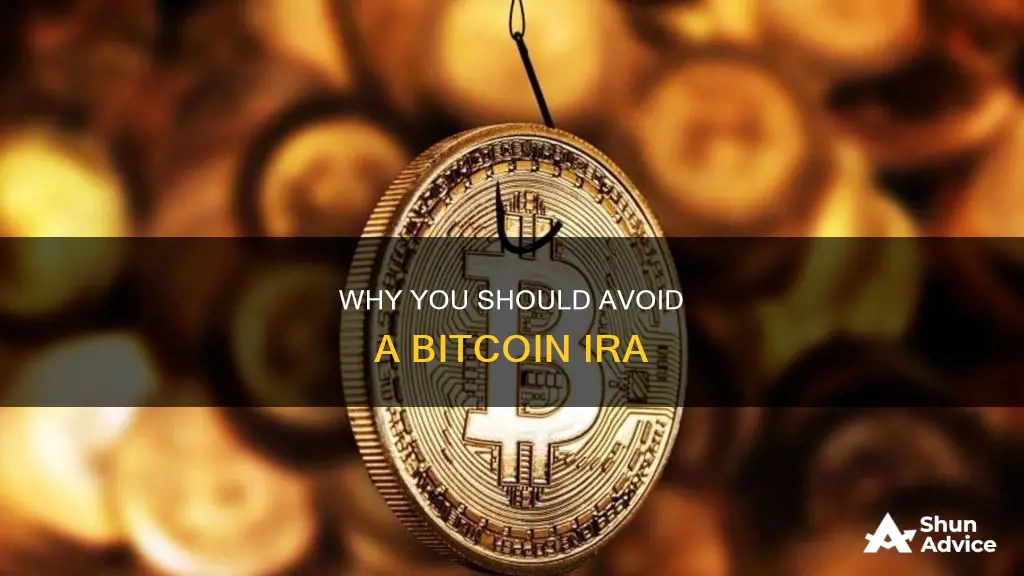
Investing in Bitcoin for retirement may seem like a good idea, especially with the hype surrounding cryptocurrency in recent times. However, there are several reasons why it may not be a prudent choice. Here are some considerations to keep in mind before investing in a Bitcoin IRA.
| Characteristics | Values |
|---|---|
| Volatility | Extreme price swings |
| Risk | Potential for total loss of investment |
| Regulation | Considered property by the IRS |
| Fraud | Potential for scams and fraudulent schemes |
| Fees | Set-up, transaction, and annual account management fees |
| Tax | No tax loss harvesting |
| Complexity | Additional steps and considerations |
What You'll Learn
- Bitcoin IRAs are not widely available and are expensive to maintain
- Self-directed IRAs require a specialised firm or custodian, with high compliance costs
- Self-directed IRAs are personally liable for any rules broken
- The SEC has warned of the potential for fraud in self-directed IRAs
- Cryptocurrency is volatile and may not be the best option in a retirement portfolio

Bitcoin IRAs are not widely available and are expensive to maintain
Bitcoin IRAs are a type of self-directed IRA that holds cryptocurrency. They are not widely available because there is no specific Individual Retirement Account (IRA) recognised by the Internal Revenue Service (IRS) designed for cryptocurrencies. As such, investors must enlist the help of a custodian, which can be challenging. Custodians who will custody crypto assets in an IRA are rare. Self-directed IRAs (SDIRAs) are more likely to allow alternative assets like cryptocurrencies.
Bitcoin IRAs are also expensive to maintain. They often come with several additional fees, including set-up fees, transaction fees, and annual account management fees. For example, setting up a $50,000 self-directed IRA account for trading can cost several thousand dollars in charges during the initial setup, depending on the provider. There are also recurring custody and maintenance fees charged by providers of these services. Each cryptocurrency trade incurs fees from the service provider's trading partner and custodian. A typical provider may charge 3.5% per transaction per purchase and 1% or a flat fee for each sale. Blockchain processing fees may also be charged.
The additional fees and the challenge of finding a custodian mean that Bitcoin IRAs are not only difficult to set up but also expensive to maintain.
Peter Jones' Bitcoin Loophole: A Smart Investment?
You may want to see also

Self-directed IRAs require a specialised firm or custodian, with high compliance costs
Self-directed IRAs, including those that hold cryptocurrencies, require a custodian to hold the assets in the account. The custodian can be a bank, a licensed trust firm, or another organisation allowed by the IRS to serve in a custodial capacity. They ensure the account adheres to IRS rules, such as contribution limits and reporting requirements.
Custodians of self-directed IRAs are often financial institutions or trust companies, and they tend to be smaller and lower profile than the custodians of traditional IRAs. They also charge various fees, including set-up fees, transaction fees, and annual account management fees.
The process of becoming a self-directed IRA custodian is rigorous and complex, requiring companies to meet specific legal and IRS regulations and provide a capital pledge, liability insurance, and a fidelity bond, among other qualifications. They must also undergo regular audits to ensure compliance with all applicable laws and regulations.
When choosing a custodian for a self-directed IRA, it is essential to consider factors such as customer testimonials, security protocols, fees, and the company's knowledge and expertise in the desired investment area.
The Ultimate Guide to Investing in Bitcoin
You may want to see also

Self-directed IRAs are personally liable for any rules broken
Self-directed IRAs allow investors to put money into a broader range of assets than other types of IRAs. These include "alternative assets" such as real estate, precious metals, private placement securities, and crypto assets. While this type of IRA gives investors more control over their investment portfolio, it also comes with greater responsibility and risk.
One of the key risks of self-directed IRAs is that investors are personally liable for any rules broken. This is because self-directed IRAs do not provide the same regulatory protection as traditional IRAs. The custodian of a self-directed IRA is not responsible for vetting investment choices or providing investment advice. The investor is solely responsible for evaluating and understanding the investments in the account and ensuring compliance with tax laws.
Breaking the rules of a self-directed IRA can result in severe tax consequences. For example, engaging in a transaction with a "disqualified person" can cause the IRA to lose its tax benefits. A disqualified person includes the IRA investor's spouse, lineal descendants, and spouses of lineal descendants. The IRA investor also cannot use the self-directed IRA for personal benefit. All income from IRA assets must be put back into the IRA account.
Another important rule is that certain investments are disallowed. For example, IRAs, including self-directed IRAs, cannot invest in life insurance, certain collectibles such as art or antiques, or any assets that are considered illiquid or illegal.
To avoid breaking the rules, self-directed IRA investors should consult with a tax or financial advisor and carefully research any investments before proceeding.
The Future of Money: Why Invest in Bitcoins?
You may want to see also

The SEC has warned of the potential for fraud in self-directed IRAs
The U.S. Securities and Exchange Commission (SEC) has warned investors about the potential risks associated with self-directed Individual Retirement Accounts (self-directed IRAs). Self-directed IRAs allow investors to put their money into a broader range of assets than other types of IRAs, including real estate, private placement securities, precious metals, commodities, and crypto assets.
While self-directed IRAs can be a safe way to invest retirement funds, the SEC has cautioned that they carry a heightened risk of fraud. This is because self-directed IRAs allow investors to hold unregistered securities, and the custodians or trustees of these accounts may offer only limited protections. Fraud promoters often target self-directed IRAs as they permit investors to hold unregistered securities, and the custodians or trustees of these accounts likely have not investigated the securities or the background of the promoter.
The SEC has brought numerous cases in which promoters of fraudulent schemes steered investors towards self-directed IRAs. The SEC warns that fraudsters may misrepresent the duties of self-directed IRA custodians to deceive investors into believing that their investments are legitimate or protected against losses. For example, fraudsters often falsely claim or imply that self-directed IRA custodians investigate and validate any investment in a self-directed IRA.
The SEC also warns that the tax-deferred nature of self-directed IRAs can make them attractive to fraudsters, as investors may be reluctant to withdraw money prematurely and incur a financial penalty. This may allow a fraudster to perpetuate their scheme for longer.
To protect themselves from fraud, the SEC advises investors to verify information in self-directed IRA account statements, avoid unsolicited investment offers, be wary of "guaranteed" returns, and ask questions about the person offering the investment and the investment itself.
Apple's Bitcoin Investment: Did it Happen?
You may want to see also

Cryptocurrency is volatile and may not be the best option in a retirement portfolio
Cryptocurrency is a trendy investment option, but it is a very risky choice for retirement. The crypto market is extremely volatile, and cryptocurrencies are high-risk assets.
Cryptocurrencies are taxed as property by the IRS, and there are additional challenges and fees associated with including them in an IRA. These include set-up fees, transaction fees, and annual account management fees.
The extreme volatility of cryptocurrencies makes them a risky choice for retirement savings. For example, Bitcoin, the leading cryptocurrency, has experienced significant price fluctuations, ranging from virtually no value to nearly $75,000 since 2009. This makes it unsuitable for someone approaching retirement who needs stable and liquid assets.
Additionally, many cryptocurrencies are not backed by businesses or assets, so they may lose value if they lose the interest of the public and investors. The risk of loss is high, as the value of a cryptocurrency can fall significantly and never recover.
While cryptocurrency can provide diversification to a retirement portfolio, it is important to consider the level of risk associated with these volatile assets. Most investment experts suggest keeping the bulk of retirement assets in the stock market or low-fee, diverse exchange-traded funds (ETFs).
If you are considering investing in cryptocurrency for retirement, it is important to do your research and understand the risks involved. Consult a financial advisor to ensure your money is being put to its best use and determine if cryptocurrency is a suitable option for your retirement portfolio.
The Future of Bitcoin Investment: What You Need to Know
You may want to see also
Frequently asked questions
Investing in Bitcoin for retirement is not recommended due to its volatile and speculative nature. Cryptocurrency is subject to extreme price swings, which makes it a risky investment, especially for those close to retirement.
Self-directed IRAs typically come with additional fees such as set-up fees, transaction fees, and annual account management fees. These fees can be costly and impact your ability to reach your retirement goals.
With a self-directed IRA, you are personally responsible for ensuring compliance with IRS rules. If any rules are broken, your account may lose its tax-deferred status. Self-directed IRAs are also more susceptible to fraudulent schemes and volatile performance.
Yes, there are other options for including cryptocurrency in your retirement portfolio. For example, a small number of 401(k) plans allow participants to hold a portion of their account balance in crypto. Additionally, solo 401(k) plans for small business owners and solo entrepreneurs may also offer the ability to hold cryptocurrency.







